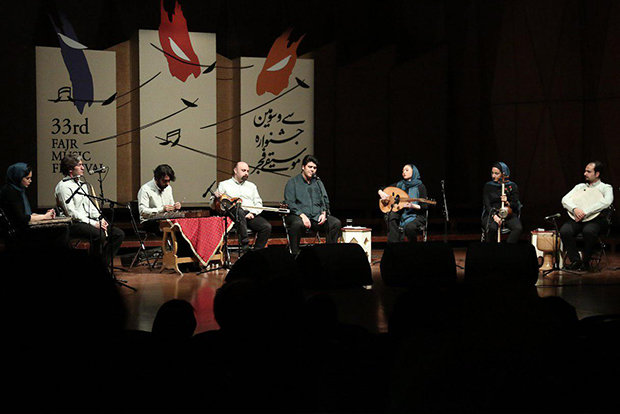Fajr International Festival of Music is the most important music event in Iran and even in the Middle East. The 2018 edition of the event was held in Tehran in January 10-20.
On Wednesday January 17, Naghsh Ensemble went on stage at Roudaki auditorium where the venue was packed with music-lovers who wanted to see the latest performance of the group.
Naghsh Ensemble was founded in November 2010 by Amir Sharifi. The ultimate goal of Naghsh ensemble is to create music based on the musical modal system in traditional Persian music, called 'Dastgah', whilst also incorporating many other features of classical music of Iran.
At the end of the concert I talked with Mehdi Emami, the singer of the ensemble. He was born in Tehran in 1982 and he has graduated in Civil Engineering. At a very young age he started learning music from his father Ahmad Emami, first playing the Tombak and Daf and then moving on to the Santour. He learnt to play the Santour from Masters Hossein Shokoufa and Masoud Shenasa, then began to focus on traditional Iranian singing techniques studying under the well-renowned Masters Mohammad Reza Shajarian, Mohammad Reza Lotfi, Mohsen Keramati and Hasan Adib. He has contributed to many albums that have been distributed in Iran like Bazm-e dowr, Barafshan, Chaharsu, and Sarkhaneh. He has also performed for Molana, Hafez and Ashoora operas.
When I talked with the lead of the ensemble, Amir Sharifi, who also composes the pieces to be performed by the ensemble, he told me that the musical repertoire of Naghsh ensemble is composed of two elements; the first comprising of pieces that are based on the musical style of the Qajar period of Iran (18th and 19th centuries), and the second comprising of pieces based on the modal, rhythmic and formal system of pre-Qajar period. These second pieces exhibit many features deriving from the old treatises of Safavid and Timurid eras of Iran (13th to 17th centuries).
The ensemble is comprised of Amir Sharifi, who plays the Tar and Setar in addition to leading the group and composing the pieces of their repertoire, Marjan Mehraban who plays the Kanun, Arsash Saeidian who plays the Oud, Elmira Mardaneh who plays the Kamancheh, Hoshmand Ebadi who plays the Ney, Mohammad Eshghi who plays the Santour, and Soheil Allahdadian who plays the Tombak and the Bendir.
Fajr Music Festival, Iran’s most prominent Music Festival, is annually held in January in different sections, wherein many renowned national and international musicians perform in diverse genres.
Founded in 1986, the festival was first called “The Revolutionary Songs and Anthems Festival” and twelve ensembles performed in its first edition to celebrate and embark on the first important music event of the country after the revolution. For four years, it was considered as the only occasion in which the Iranian musicians and maestros could perform and hold concerts.
After the end of the imposed war against Iran in 1990, the name was changed to “Fajr Music Festival”. Two years later, the festival was held as an international event for the first time and several foreign ensembles came to Iran to perform in diverse musical genres, mostly from Muslim nations such as Tajikistan, Azerbaijan and India. Afterwards, in different editions, the attendance of many well-known world musicians from all around the world has paved the way for a more effective intercultural musical dialogue between Iran and other countries and kindled new inspirations in our musical context.
The 33rd edition of Fajr Music Festival opened in Tehran on January 10 and after ten nights of 90 performances from Iranian and foreign ensembles, orchestras, soloists, and vocalists in diverse genres of folklore, classical, traditional, and Persian pop at as many as six venues, it wrapped up on January 20.
Best performances were honored with the ‘Barbad’ Award during a closing ceremony on Saturday, January 20, at Vahdat Hall, Tehran.
YNG/PR

























Your Comment